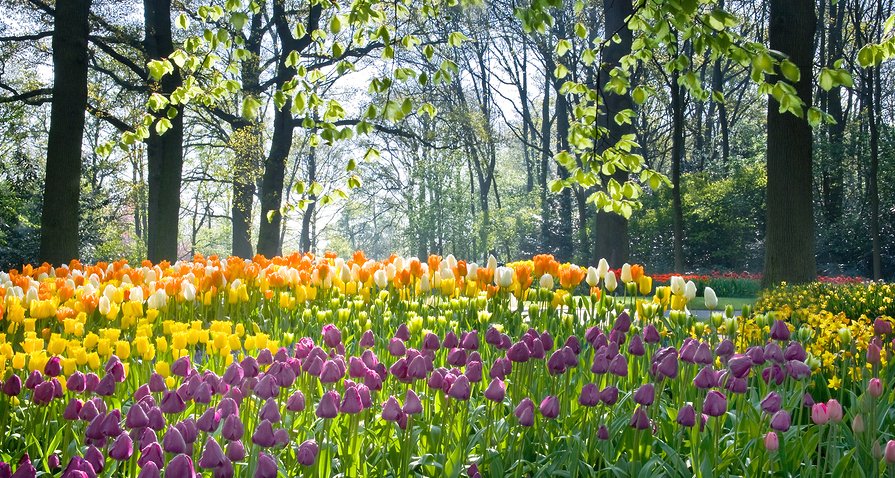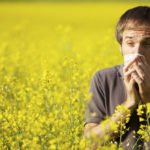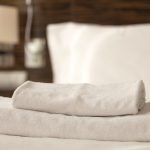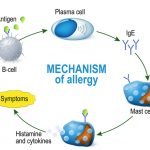If you’re prone to seasonal allergies, with spring in the air right now, you might be wishing that you could magically transport yourself to a pollen-free place. The question is, where? Where can you go that won’t have you wheezing, sneezing, and wiping your runny eyes? As we reported several years ago, seasonal allergies have been increasing at an extraordinary rate throughout the US. With global warming, spring now arrives an average of at least two weeks earlier than in the past and growing season extends into fall, keeping pollens in the air for far longer. And if you don’t believe in global warming, warmer weather is still arriving earlier and leaving later than any time in recorded history—for whatever reason. Anyway, it seems almost no place is immune from omnipresent allergy-causing irritants, but in fact, some places definitely are worse than others.
That said, there isn’t one particular place that’s great for all allergy sufferers, since people have different types of allergies. The places that work best for you will depend on what type of allergies you suffer from. If you’re allergic to tree pollens and grasses, you want to be somewhere with fewer things blooming in the spring. For instance, the Southwest or any arid location might be your best bet, providing you aren’t allergic to pollens specific to that region. I know someone who moved to New Mexico to escape allergies, only to develop such a severe juniper allergy that he had to relocate back to San Francisco. On the other hand, if ragweed is your nemesis, the Northwest should provide haven, since ragweed hasn’t inundated that area yet. People with mold allergies will need to look elsewhere, however.
The Allergy & Asthma Foundation of America (AAFA) publishes an annual list of the best and worst 100 places in the US for those with allergies.1 http://www.aafa.org/media/Spring-Allergy-Capitals-2016-Rankings.pdf These results are based on daily pollen count, amount of allergy medicine sold, and the number of Board Certified Allergists per patient. Again, a place with a high pollen count might not be a problem for you if the particular pollens in the air don’t irritate you, but places with lots of pollen and high levels of allergy-medication sales generally are not great bets for allergic folks.
In 2015, the best US cities for those with allergies, according to the report, were San Diego (the best), Daytona Beach, Colorado Springs, Provo (Utah), and Sacramento (CA). In 2016, Daytona Beach, Florida, came out on top, followed by Denver in the number two spot, then Provo, San Diego, and Palm Bay, Florida. It’s interesting to note that pollen count does not necessarily predict medication use. For instance, Seattle, Washington has a higher pollen count than Washington, D.C., but lower sales volume of allergy medications. Why? Perhaps more people in Seattle use alternate means of controlling allergies, or perhaps the pollens in Seattle get dispersed by ocean breezes while the heavy, humid Washington, D.C. air traps pollens so that residents have constant exposure to them.
As for the worst spots in the US, Jackson, Mississippi took top honors in 2016, with very high pollen counts and excessive medication use and very few allergy specialists available to help. Next worst places, in order, were Memphis, Tennessee; Syracuse, New York; Louisville, Kentucky; and McAllen, Texas.
At a glance, it’s striking that places in the western US tend to have lower pollen counts and fewer allergy problems, in general, than cities in the East. In fact, the top worst 21 places for allergies are all in the eastern half of the US, with the exception of McAllen, Texas. San Antonio, Texas, takes the 22nd worst spot. Lush Tucson, Arizona, is the next worst western city, at number 24.
Why is the West less allergenic? States in the Pacific Northwest tend to have less ragweed than in the Eastern states.2 “Anchorage getting some of the highest pollen counts in the world.” 12 May 2014. Seattle Times. 21 April 2018. http://www.seattletimes.com/nation-world/anchorage-getting-some-of-the-highest-pollen-counts-in-the-world/ Also, dry conditions throughout much of California and the Southwest keep mold to a minimum. In general, mountainous regions tend to be lower-pollen places because high-elevation doesn’t nurture wild grass, a chief irritant. Also, colder places with shorter growing seasons usually rank among the better places for allergic people (which is why the warmer temperatures we mentioned earlier are so problematic), as do locations near the ocean, where salt-water breezes blow pollens away and plants wither in beachside sand. In other words, you should be fairly clear in Antarctica, although climate change seems to be altering pollen patterns. A 2014 article in the Seattle Times reported that Anchorage, Alaska had been experiencing some of the highest pollen counts in the world that spring, mostly from birch trees.3 “Can Relocating Help Allergy Sufferers?” American Academy of Allergy, Asthma, and Immunology. 23 April 2018. http://www.aaaai.org/conditions-and-treatments/library/allergy-library/can-relocating-help-allergy-sufferers
Should you relocate to reduce your allergy symptoms? Probably not. You might develop new allergies in your new location, and virtually no place is guaranteed allergy free. Experts suggest that you vacation in a low-allergy region during the high-pollen season to get some relief. Of course, if your allergies are so serious that they’re landing you in the hospital, that’s a different story. If you’re thinking of relocating, first try out a few weeks during both spring and fall allergy seasons to make sure your chosen destination is a good bet.
But before going that route, do whatever you can to lessen seasonal allergies. The first step is to minimize dust mites by vacuuming and dusting frequently, using a good air filter in your home and work place, and covering bedding with allergen-resistant casings. Shower frequently to keep pollens off your body, and drink peppermint tea, which is a natural decongestant. Some say eating local honey helps. You can seek out a specialist who practices Natural Allergy Elimination Technique (NAET), which works well for some people. Just search the internet for allergy relief technique or allergy elimination technique in your region.
Finally, you might want to consider Jon Barron’s Baseline of Health approach to eliminating allergies. It focuses on regular full body detoxing to empower your body to throw off allergies and keep them from returning along with proteolytic enzyme supplementation to remove Circulating Immune Complexes.
References
| ↑1 | http://www.aafa.org/media/Spring-Allergy-Capitals-2016-Rankings.pdf |
|---|---|
| ↑2 | “Anchorage getting some of the highest pollen counts in the world.” 12 May 2014. Seattle Times. 21 April 2018. http://www.seattletimes.com/nation-world/anchorage-getting-some-of-the-highest-pollen-counts-in-the-world/ |
| ↑3 | “Can Relocating Help Allergy Sufferers?” American Academy of Allergy, Asthma, and Immunology. 23 April 2018. http://www.aaaai.org/conditions-and-treatments/library/allergy-library/can-relocating-help-allergy-sufferers |











